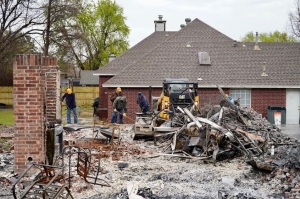Be Ready: How to Prepare for a Hurricane, After the Storm
Hurricane Preparedness Resource List
Hurricanes are dangerous events. Those of us who have lived through one of these fierce storms are aware of their life-threatening potential.
If you're new to the area, it's easy to fall victim to the "How bad can a storm be?" syndrome. If you have lived in the same area for a while, it is even easier to get too confident and not take necessary precautions to prepare your family for the oncoming storm.
Here is a list of some simple measures you can take now to ensure that your family is ready for hurricane season.
HURRICANE BASICS:
The ingredients for a hurricane include a pre-existing weather disturbance, warm tropical oceans, moisture, and relatively light winds aloft. If the right conditions persist long enough, they can combine to produce the violent winds, incredible waves, torrential rains, and floods we associate with this phenomenon.
Hurricanes are categorized according to the strength of their winds using the Saffir-Simpson Hurricane Scale. A Category 1 storm has the lowest wind speeds, while a Category 5 hurricane has the strongest. These are relative terms, because lower category storms can sometimes inflict greater damage than higher category storms, depending on where they strike and the particular hazards they bring. In fact, tropical storms can also produce significant damage and loss of life, mainly due to flooding.
WATCH vs. WARNING - KNOW THE DIFFERENCE:
• TROPICAL STORM WATCH: An announcement that tropical storm conditions (sustained winds of 39 to 73 mph) are possible within the specified coastal area within 48 hours.
• TROPICAL STORM WARNING: An announcement that tropical storm conditions (sustained winds of 39 to 73 mph) are expected somewhere within the specified coastal area within 36 hours.
• HURRICANE WATCH: An announcement that hurricane conditions (sustained winds of 74 mph or higher) are possible within the specified coastal area. Because hurricane preparedness activities become difficult once winds reach tropical storm force, the hurricane watch is issued 48 hours in advance of the anticipated onset of tropical-storm-force winds.
• HURRICANE WARNING: An announcement that hurricane conditions (sustained winds of 74 mph or higher) are expected somewhere within the specified coastal area. Because hurricane preparedness activities become difficult once winds reach tropical storm force, the hurricane warning is issued 36 hours in advance of the anticipated onset of tropical-storm-force winds.
USEFUL INFORMATION:
TRACK CURRENT HURRICANES HERE: http://www.weather.gov/os/hurricane/index.shtml
FREQUENTLY ASKED QUESTIONS ABOUT HURRICANES HERE: http://www.aoml.noaa.gov/hrd/tcfaq/tcfaqHED.html
BE PREPARED: http://www.ready.gov/america/beinformed/hurricanes.html#content
Step 1: Build A Kit / "To-Go Bag"
Get an Emergency Supply Kit, which includes items like non-perishable food, water, a battery-powered or hand-crank radio, extra flashlights and batteries. You may want to prepare a portable kit and keep it in your car in case you are told to evacuate.
THIS IS WHAT YOU NEED: http://www.ready.gov/america/getakit/index.html
Step 2: Make A Plan
Prepare your family
Make a Family Emergency Plan. Your family may not be together when disaster strikes, so it is important to know how you will contact one another, how you will get back together and what you will do in case of an emergency. You should also consider:
• Evacuation plans:
http://www.ready.gov/america/makeaplan/evacuating.html
• Family communications:
http://www.ready.gov/america/_downloads/FamEmePlan.pdf
• Utility shut-off and safety:
http://www.fema.gov/plan/prepare/utilityplan.shtm
• Safety skills:
http://www.fema.gov/plan/prepare/safetyplan.shtm
Prepare Your Business
Businesses have a critical role in preparedness. Putting a disaster plan in motion now will improve the likelihood that your company will survive and recover.
Ready Business outlines commonsense measures business owners and managers can take to start getting ready. http://www.ready.gov/business/index.html
Plan to Protect Property
Hurricanes cause heavy rains that can cause extensive flood damage in coastal and inland areas. Everyone is at risk and should consider flood insurance protection. Flood insurance is the only way to financially protect your property or business from flood damage. To learn more about your flooding risk and how to protect yourself and your business, visit the NFIP Web site, www.floodsmart.gov or call 1-800-427-2419.
In addition to insurance, you can also:
• Cover all of your home's windows with pre-cut ply wood or hurricane shutters to protect your windows from high winds.
• Plan to bring in all outdoor furniture, decorations, garbage cans and anything else that is not tied down.
• Keep all trees and shrubs well trimmed so they are more wind resistant.
• Secure your home by closing shutters, and securing outdoor objects or bringing them inside.
• Turn off utilities as instructed. Otherwise, turn the refrigerator thermostat to its coldest setting and keep its doors closed.
• Turn off propane tanks.
• Install a generator for emergencies
• Reinforce your garage doors; if wind enters a garage, it can cause dangerous and expensive structural damage.
• Ensure a supply of water for sanitary purposes such as cleaning and flushing toilets. Fill the bathtub and other large containers with water.
• Find out how to keep food safe during and after and emergency by visiting www.FoodSafety.gov.
Step 3: Be Informed
Hurricane hazards come in many forms: lightning, tornadoes, flooding, storm surge, high winds, even landslides or mudslides can be triggered in mountainous regions. Look carefully at the safety actions associated with each type of hurricane hazard and prepare your family disaster plan accordingly.
But remember this is only a guide. The first and most important thing anyone should do when facing a hurricane threat is to use common sense.
• Learn about damaging and potentially deadly hurricane hazards: http://www.fema.gov/hazard/hurricane/hu_hazard.shtm
• What to do during a hurricane: http://www.fema.gov/hazard/hurricane/hu_during.shtm
• Get your children involved (kids site): http://www.ready.gov/kids/home.html
• People with Disabilities and Other Access and Functional Needs: http://www.ready.gov/america/getakit/disabled.html
• Care for pets: http://www.fema.gov/individual/animals.shtm
RESOURCE CENTER:
Federal and National Resources
Find additional information on how to plan and prepare for a hurricane by visiting the following resources:
• Federal Emergency Management Agency: http://www.fema.gov/hazard/hurricane/index.shtm
• NOAA Hurricane Center: http://www.nhc.noaa.gov/
• American Red Cross: http://www.redcross.org/
• U.S. Environmental Protection Agency: http://www.epa.gov/hurricanes/
• U.S. Department of Health and Human Services, Center for Disease Control: http://emergency.cdc.gov/disasters/hurricanes/
Encourage Electronic Payments for Federal Benefit Recipients
Keep in mind a disaster can disrupt mail service for days or even weeks. For those who depend on the mail for their Social Security benefits, a difficult situation can become worse if they are evacuated or lose their mail service – as 85,000 check recipients learned after Hurricane Katrina. Switching to electronic payments is one simple, significant way people can protect themselves financially before disaster strikes. It also eliminates the risk of stolen checks.
The U.S. Department of the Treasury recommends two safer ways to get federal benefits:
• Direct deposit to a checking or savings account is the best option for people with bank accounts. The Direct Express ® prepaid debit card is also available for people who don’t have a bank account. Federal benefit recipients can sign up by calling (800) 333-1795 or at www.GoDirect.org/
(Sources: NASA, NOAA, FEMA, U.S. Government Site Services)





























